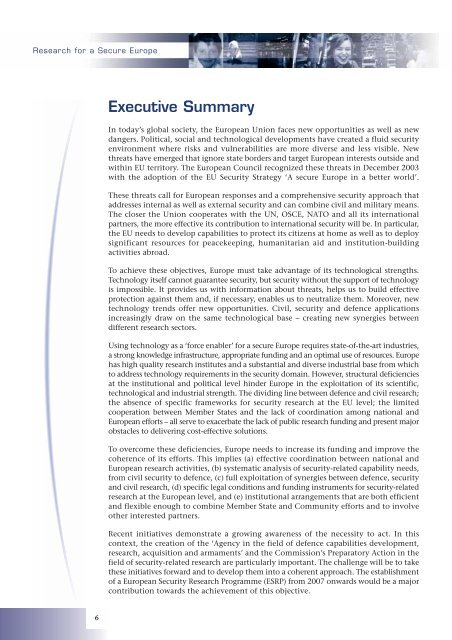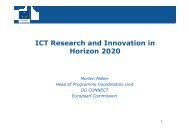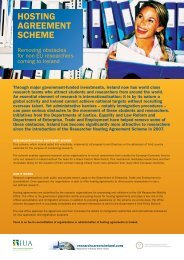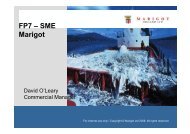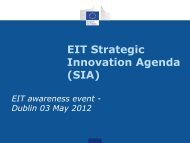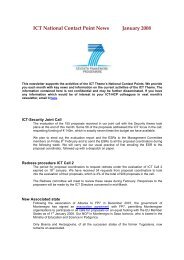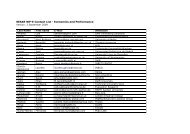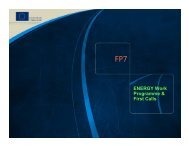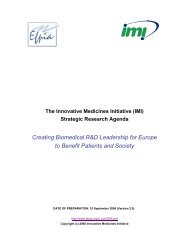Research for a Secure Europe - European Commission - Europa
Research for a Secure Europe - European Commission - Europa
Research for a Secure Europe - European Commission - Europa
You also want an ePaper? Increase the reach of your titles
YUMPU automatically turns print PDFs into web optimized ePapers that Google loves.
<strong>Research</strong> <strong>for</strong> a <strong>Secure</strong> <strong>Europe</strong><br />
Executive Summary<br />
In today’s global society, the <strong>Europe</strong>an Union faces new opportunities as well as new<br />
dangers. Political, social and technological developments have created a fluid security<br />
environment where risks and vulnerabilities are more diverse and less visible. New<br />
threats have emerged that ignore state borders and target <strong>Europe</strong>an interests outside and<br />
within EU territory. The <strong>Europe</strong>an Council recognized these threats in December 2003<br />
with the adoption of the EU Security Strategy ‘A secure <strong>Europe</strong> in a better world’.<br />
These threats call <strong>for</strong> <strong>Europe</strong>an responses and a comprehensive security approach that<br />
addresses internal as well as external security and can combine civil and military means.<br />
The closer the Union cooperates with the UN, OSCE, NATO and all its international<br />
partners, the more effective its contribution to international security will be. In particular,<br />
the EU needs to develop capabilities to protect its citizens at home as well as to deploy<br />
significant resources <strong>for</strong> peacekeeping, humanitarian aid and institution-building<br />
activities abroad.<br />
To achieve these objectives, <strong>Europe</strong> must take advantage of its technological strengths.<br />
Technology itself cannot guarantee security, but security without the support of technology<br />
is impossible. It provides us with in<strong>for</strong>mation about threats, helps us to build effective<br />
protection against them and, if necessary, enables us to neutralize them. Moreover, new<br />
technology trends offer new opportunities. Civil, security and defence applications<br />
increasingly draw on the same technological base – creating new synergies between<br />
different research sectors.<br />
Using technology as a ‘<strong>for</strong>ce enabler’ <strong>for</strong> a secure <strong>Europe</strong> requires state-of-the-art industries,<br />
a strong knowledge infrastructure, appropriate funding and an optimal use of resources. <strong>Europe</strong><br />
has high quality research institutes and a substantial and diverse industrial base from which<br />
to address technology requirements in the security domain. However, structural deficiencies<br />
at the institutional and political level hinder <strong>Europe</strong> in the exploitation of its scientific,<br />
technological and industrial strength. The dividing line between defence and civil research;<br />
the absence of specific frameworks <strong>for</strong> security research at the EU level; the limited<br />
cooperation between Member States and the lack of coordination among national and<br />
<strong>Europe</strong>an ef<strong>for</strong>ts – all serve to exacerbate the lack of public research funding and present major<br />
obstacles to delivering cost-effective solutions.<br />
To overcome these deficiencies, <strong>Europe</strong> needs to increase its funding and improve the<br />
coherence of its ef<strong>for</strong>ts. This implies (a) effective coordination between national and<br />
<strong>Europe</strong>an research activities, (b) systematic analysis of security-related capability needs,<br />
from civil security to defence, (c) full exploitation of synergies between defence, security<br />
and civil research, (d) specific legal conditions and funding instruments <strong>for</strong> security-related<br />
research at the <strong>Europe</strong>an level, and (e) institutional arrangements that are both efficient<br />
and flexible enough to combine Member State and Community ef<strong>for</strong>ts and to involve<br />
other interested partners.<br />
Recent initiatives demonstrate a growing awareness of the necessity to act. In this<br />
context, the creation of the ‘Agency in the field of defence capabilities development,<br />
research, acquisition and armaments’ and the <strong>Commission</strong>’s Preparatory Action in the<br />
field of security-related research are particularly important. The challenge will be to take<br />
these initiatives <strong>for</strong>ward and to develop them into a coherent approach. The establishment<br />
of a <strong>Europe</strong>an Security <strong>Research</strong> Programme (ESRP) from 2007 onwards would be a major<br />
contribution towards the achievement of this objective.<br />
6


